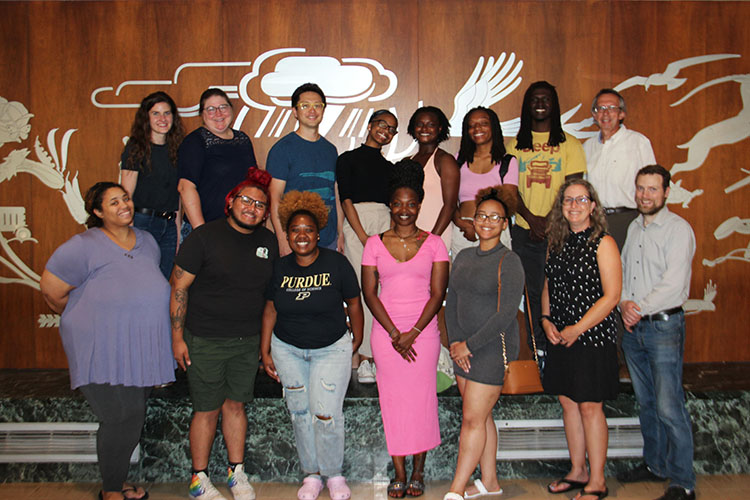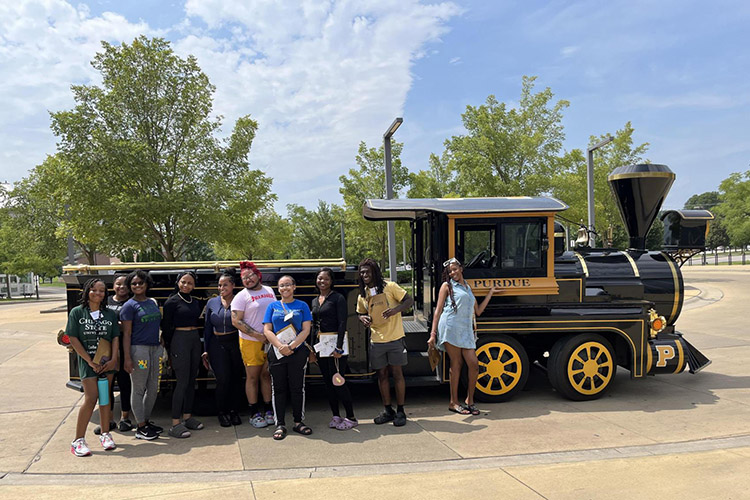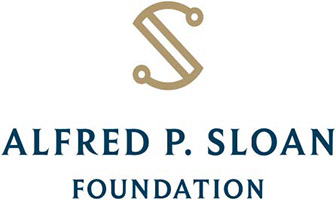Sloan-PReMiSS: Partnering in Research Mentoring for Minoritized Students in STEM

The first cohort of students from Chicago State University was hosted at Purdue for a summer research experience in 2023. Here are CSU students, PReMMiSS leaders, and graduate and faculty mentors from Purdue.
Partners:
- Purdue University
- Chicago State University
- Alfred P. Sloan Foundation: The Equitable Pathways Program
The Challenge
Over the last few decades, investments in millions of dollars have been made with a goal to attract and support Black/African American students to thrive in STEM graduate programs. To date, many of these efforts continue to rely on transforming students rather than broader institutional structures. Importantly, the voices, knowledge, and experiences of minoritized students themselves are often not considered. We bring together Chicago State University (CSU), a Predominantly Black Institution, and Purdue University, a Predominantly White Institution, in a partnership that aims to drive systemic change at both institutions.

Objectives
- To reduce barriers towards graduate education for undergraduate students historically excluded and minoritized in STEM fields, building science identity and a sense of belonging in STEM research early on in their academic path.
- To drive systemic change at both CSU and Purdue through an authentic partnership and the development of a joint mentoring and training program that will equip faculty and students with increased cultural competencies.
- To widely disseminate a model where partner institutions learn from each other and work jointly to spur innovation.
Approach
- Develop and implement a CSU-Purdue joint mentoring program that is based on student feedback and aims to build a sense of STEM identity for students from historically under-served populations, providing research-based and culturally responsive mentorship from the first year of undergraduate studies.
- Develop and implement a mentor and mentee training program that will focus on increasing cultural competencies leveraging resources available through the Purdue Center for Intercultural Learning Mentorship Assessment and Research (CILMAR).
- Prepare CSU students as well as CSU and Purdue mentors for summer research experiences that will introduce students to STEM research paths.
- Evaluate the mentor and mentee interactions in the research setting and use evaluations to transform future mentor/mentee training.
- Set the foundations for sustainability and scalability of our interventions through Integration with existing programs at both Purdue and CSU.

Our First Cohort
The first cohort of students from Chicago State University was hosted at Purdue for a summer research experience in 2023. Offering undergraduate research opportunities as well as faculty and peer mentoring and training in effective cross-cultural communication the program supports CSU students to succeed in the Sciences, opening up paths to Graduate Education.
Roster of Sloan Faculty Fellows at Purdue and Team Members
Advisory Board
- Dr. Christopher Botanga: Professor of Biology & Director of ILSAMP; Illinois Louis Stokes Alliance for Minority Participation (ILSAMP); Chicago State University
- Dr. Levon Esters: Dean of Graduate School; Vice Provost for Graduate Education; Penn State University
- Dr. Kevin Gibson: Associate Dean; Graduate School & Sloan Project Director; Purdue University
- Dr. Maureen Vandermaas-Peeler: Professor of Psychology & Director; Center for Research on Global Engagement; Elon University
Program Coordinators
- Dr. Kris Acheson-Clair: Center for Intercultural Learning, Mentorship, Assessment and Research (CILMAR); Purdue University
- Joyce Ache Gana: Professor of Biology Chair; Chicago State University
- Dr. Stephanie Gardner: Associate Professor and Associate Head for Curriculum, Teaching, and Learning; Department of Biological Sciences, Purdue University
- Kristy Mardis: Professor and Chair of Chemistry, Physics, and Engineering Studies; Chicago State University
- Peristera Paschou: Associate Dean for Graduate Education and Strategic Initiatives, College of Science; Purdue University
- Jacquelyn Thomas-Miller: Director of Advising and Retention; Purdue University

Sloan PReMMiSS Fellows
Faculty
- Walid Al-Ghoul: Professor of Physiology; Chicago State University
- Jeffrey Dick: Richard B. Wetherill Associate Professor of Chemistry; Department of Chemistry; Purdue University
- Jimmy Dooley: Assistant Professor; Department of Biological Sciences; Purdue University
- Valerie Goss: Associate Professor of Chemistry; Chicago State University
- Christina Li: Assistant Professor, Inorganic Chemistry; Department of Chemistry; Purdue University
- Mark Lipton: Associate Professor, Organic Chemistry and Chemical Biology; Department of Chemistry; Purdue University
- Molly McDonough: Assistant Professor of Biology; Chicago State University
- Andrew Maselli: Professor of Biology; Chicago State University
- Brian Metzger: Assistant Professor; Department of Biological Sciences; Purdue University
- Archie Peters: Associate Professor of Physics; Chicago State University
- Yulia Pushkar: Professor; Department of Physics and Astronomy; Purdue University
- Mike Reppert: Assistant Professor, Physical/Thoeretical Chemistry; Department of Chemistry; Purdue University
- Daniel Suter: Professor; Department of Biological Sciences; Purdue University
- Dylan Wainwright: Assistant Professor; Department of Biological Sciences; Purdue University
Graduate Students
- Gentry Lee Andrews: Department of Biological Sciences, Purdue University (Alumni)
- Tyler Renee Pikes: Department of Biological Sciences, Purdue University
- Annika Robinson-Hudspeth: Department of Biological Sciences, Purdue University
- Paola Nicole Vega Rodriguez: Department of Biological Sciences, Purdue University
- De'Shovon Shenault: Department of Chemistry, Purdue University (Alumni)

This work is supported, in major part, by Alfred P. Sloan Foundation Grant #G-2022-19555.